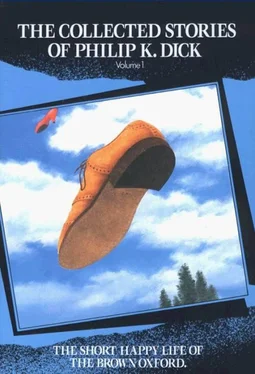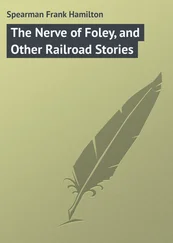“She was in the repair shop,” Bobby announced. “I guess she got sort of tired. She’s old, Daddy says. I heard him and Mommy talking.”
A little sadly they continued on, with Nanny painfully following. Now they had come to benches placed here and there on the lawn, with people languidly dozing in the sun. On the grass lay a young man, a newspaper over his face, his coat rolled up under his head. They crossed carefully around him, so as not to step on him.
“There’s the lake!” Jean shouted, her spirits returning.
The great field of grass sloped gradually down, lower and lower. At the far end, the lowest end, lay a path, a gravel trail, and beyond that, a blue lake. The two children scampered excitedly, filled with ancitipation. They hurried faster and faster down the carefully-graded slope, Nanny struggling miserably to keep up with them.
“The lake!”
“Last one there’s a dead Martian stinko-bug!”
Breathlessly, they rushed across the path, onto the tiny strip of green bank against which the water lapped. Bobby threw himself down on his hands and knees, laughing and panting and peering down into the water. Jean settled down beside him, smoothing her dress tidily into place. Deep in the cloudy-blue water some tadpoles and minnows moved, minute artificial fish too small to catch.
At one end of the lake some children were floating boats with flapping white sails. At a bench a fat man sat laboriously reading a book, a pipe jammed in his mouth. A young man and woman strolled along the edge of the lake together, arm in arm, intent on each other, oblivious of the world around them.
“I wish we had a boat,” Bobby said wistfully.
Grinding and clashing, Nanny managed to make her way across the path and up to them. She stopped, settling down, retracting her treads. She did not stir. One eye, the good eye, reflected the sunlight. The other had not been synchronized; it gaped with futile emptiness. She had managed to shift most of her weight on her less-damaged side, but her motion was bad and uneven, and slow. There was a smell about her, an odor of burning oil and friction.
Jean studied her. Finally she patted the bent green side sympathetically. “Poor Nanny! What did you do, Nanny? What happened to you? Were you in a wreck?”
“Let’s push Nanny in,” Bobby said lazily. “And see if she can swim. Can a Nanny swim?”
Jean said no, because she was too heavy. She would sink to the bottom and they would never see her again.
“Then we won’t push her in,” Bobby agreed.
For a time there was silence. Overhead a few birds fluttered past, plump specks streaking swiftly across the sky. A small boy on a bicycle came riding hesitantly along the gravel path, his front wheel wobbling.
“I wish I had a bicycle,” Bobby murmured.
The boy careened on past. Across the lake the fat man stood up and knocked his pipe against the bench. He closed his book and sauntered off along the path, wiping his perspiring forehead with a vast red handkerchief.
“What happens to Nannies when they get old?” Bobby asked wonderingly. “What do they do? Where do they go?”
“They go to heaven.” Jean lovingly thumped the green dented hull with her hand. “Just like everybody else.”
“Are Nannies born? Were there always Nannies?” Bobby had begun to conjecture on ultimate cosmic mysteries. “Maybe there was a time before there were Nannies. I wonder what the world was like in the days before Nannies lived.”
“Of course there were always Nannies,” Jean said impatiently. “If there weren’t, where did they come from?”
Bobby couldn’t answer that. He meditated for a time, but presently he became sleepy … he was really too young to solve such problems. His eyelids became heavy and he yawned. Both he and Jean lay on the warm grass by the edge of the lake, watching the sky and the clouds, listening to the wind moving through the grove of cedar trees. Beside them the battered green Nanny rested and recuperated her meager strength.
A little girl came slowly across the field of grass, a pretty child in a blue dress with a bright ribbon in her long dark hair. She was coming toward the lake.
“Look,” Jean said. “There’s Phyllis Casworthy. She has an orange Nanny.”
They watched, interested. “Who ever heard of an orange Nanny?” Bobby said, disgusted. The girl and her Nanny crossed the path a short distance down, and reached the edge of the lake. She and her orange Nanny halted, gazing around at the water and the white sails of toy boats, the mechanical fish.
“Her Nanny is bigger than ours,” Jean observed.
“That’s true,” Bobby admitted. He thumped the green side loyally. “But ours is nicer. Isn’t she?”
Their Nanny did not move. Surprised, he turned to look. The green Nanny stood rigid, taut. Its better eye stalk was far out, staring at the orange Nanny fixedly, unwinkingly.
“What’s the matter?” Bobby asked uncomfortably.
“Nanny, what’s the matter?” Jean echoed.
The green Nanny whirred, as its gears meshed. Its treads dropped and locked into place with a sharp metallic snap. Slowly its doors retracted and its grapples slithered out.
“Nanny, what are you doing?” Jean scrambled nervously to her feet. Bobby leaped up, too. “Nanny! What’s going on?”
“Let’s go.” Jean said, frightened. “Let’s go home.”
“Come on, Nanny,” Bobby ordered. “We’re going home, now.”
The green Nanny moved away from them; it was totally unaware of their existence. Down the lakeside the other Nanny, the great orange Nanny, detached itself from the little girl and began to flow.
“Nanny, you come back!” the little girl’s voice came, shrill and apprehensive.
Jean and Bobby rushed up the sloping lawn, away from the lake. “She’ll come!” Bobby said. “Nanny! Please come!”
But the Nanny did not come.
The orange Nanny neared. It was huge, much more immense than the blue Mecho jaw-model that had come into the back yard that night. That one now lay scattered in pieces on the far side of the fence, hull ripped open, its parts strewn everywhere.
This Nanny was the largest the green Nanny had ever seen. The green Nanny moved awkwardly to meet it, raising its grapples and preparing its internal shields. But the orange Nanny was unbending a square arm of metal, mounted on a long cable. The metal arm whipped out, rising high in the air. It began to whirl in a circle, gathering ominous velocity, faster and faster.
The green Nanny hesitated. It retreated, moving uncertainly away from the swinging mace of metal. And as it rested warily, unhappily, trying to make up its mind, the other leaped.
“Nanny!” Jean screamed.
“Nanny! Nanny!”
The two metal bodies rolled furiously in the grass, fighting and struggling desperately. Again and again the metal mace came, bashing wildly into the green side. The warm sun shone benignly down on them. The surface of the lake eddied gently in the wind.
“Nanny!” Bobby screamed, helplessly jumping up and down.
But there was no response from the frenzied, twisting mass of crashing orange and green.
“What are you going to do?” Mary Fields asked, tight-lipped and pale.
“You stay here.” Tom grabbed up his coat and threw it on; he yanked his hat down from the closet shelf and strode toward the front door.
“Where are you going?”
“Is the cruiser out front?” Tom pulled open the front door and made his way out onto the porch. The two children, miserable and trembling, watched him fearfully.
“Yes,” Mary murmured, “it’s out front. But where—”
Tom turned abruptly to the children. “You’re sure she’s— dead ?”
Bobby nodded. His face was streaked with grimy tears. “Pieces… all over the lawn.”
Читать дальше












